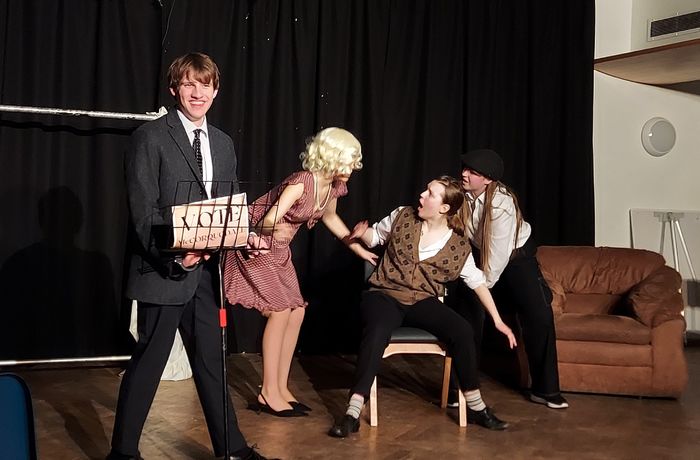‘Where are my daughters, where is my mother?’: intergenerational trauma in ‘Fallen Flowers 落花飞絮’
Poetry emerges as a powerful mechanism of resistance to the patriarchy

Fallen Flowers 落花飞絮 is a harrowing, emotionally demanding play. Born from the imagination of student writer Yasi Zhu, the intricate plot of devastating beauty follows the forgotten histories of four women, whose lives are tragically abbreviated by the horrors of human trafficking. Whilst the Corpus Playroom makes for a claustrophobic setting, Fallen Flowers achieves a social critique of epic proportions.
“A feminine, poetic landscape that eclipsed patriarchal obscenity”
Directed by Isabella Ren, the play boldly confronts the human cost of entrenched misogyny in Chinese culture, as the audience bears witness to the lost dreams and stolen youths of successive generations of women. Combining Chinese folklore and vivid poetry, Fallen Flowers presents an artful tapestry of female story-telling and offers a tribute to all the hope that might exist alongside despair.
The first scene follows a distressed Nan Nan, played by Gabrielle Kurniawan, as she stumbles across the mysterious Sister (Siew Yen Loke) and Qing (Xiaoyao Luo). This portentous meeting of three women is a sensory tour-de-force. Ina Bi’s vision as set designer transports the audience into a feminine enclave of nature and refuge. Dappled, pastoral flowers cover the walls of the theatre, and surround Nan Nan, Sister, and Qing as they embark on their journey ‘home’.
As the women set sail on a makeshift boat constructed out of two wooden chairs, a watery soundscape accompanies lyrical dialogue dedicated to the marvellous sweetness of osmanthus flowers. This extended scene offered a masterclass in immersive theatre: as Nan Nan narrates the Chinese folklore legend of Niu Lang (牛郎) and Zhi Nü (织女), the weaver and the ploughboy, I found myself pleasurably lulled by textured storytelling.
“A masterclass in immersive theatre”
The play’s reliance upon female oral culture is a politically astute aesthetic decision. Whilst the patriarchy might attempt to reduce these characters to mere sexualised objects of exchange, female subjectivity is granted ultimate dramatic agency in this play, as the women’s powerful and timeless imaginations aggregate to dominate the theatrical space.
Jacinta Ngeh was especially impressive in the heartbreaking role of Li Juan, whose childhood was violently snatched away from her by the vicious industry of marriage trafficking. She effectively embodied feelings of trauma and estrangement as her character experienced a jarring separation from her mother at the hands of male violence.
Indeed, one of Fallen Flowers’ strengths, and weaknesses, was its detailed focus on the inner lives of a whole community of women. Nan Nan, Sister, Qing, and Li Juan are all oppressed by the same brutal system. Refusing cultural amnesia, the writer excavated the repressed past of each woman, constructing an entangled web of overlapping personal histories. Despite the aesthetic complexity of this structure, the play’s formula sometimes felt repetitious. The choice to braid and interweave the stories of otherwise isolated and forgotten women was an ambitious one, but the multiple plots were a lot for an audience member to hold together all at once.
When watching the play, sometimes I craved a less thorough narration, so as to allow space for the audience to imaginatively project their own meaning upon the tragic lives of the four women. I wholly understand the writer’s desire to construct a vivid counter-history in order to rectify the cultural marginalisation of these figures. Nevertheless, it would have felt rewarding to feel actively implicated in this creative process. On the other hand, perhaps Fallen Flowers asked more of its audience than I was personally capable of giving. Being in the intimate presence of the unfathomable pain of these young women was a task I found deeply demanding, but that doesn’t make it any less important.
Gabriel Miju Yap and Donovan Sim together shouldered the difficult responsibility of depicting thoughtless male violence. I am grateful that the play was so unflinching and raw in its confrontation with normalised abuse, but I struggled with the frequent spectacles of violence, and I questioned whether such horror needed to be manifested explicitly on stage.
Indeed, the play was strongest when it let rich metaphor and intricate imagery take over, producing a feminine, poetic landscape that eclipsed patriarchal obscenity. Despite the persistence of intergenerational abuse, Fallen Flowers archives the artful resistance of marginalised communities. Cruelly abandoned by hegemonic society, the women of the play remain fiercely faithful to their fellow sisters, choosing poetry over silence.
Fallen Flowers 落花飞絮 is playing at the Corpus Playrooms from Wednesday 22nd to Saturday 25th February, 9:30pm.
 News / Clare Hall spent over £500k opposing busway 24 December 2025
News / Clare Hall spent over £500k opposing busway 24 December 2025 Comment / The ‘class’ of Cambridge24 December 2025
Comment / The ‘class’ of Cambridge24 December 2025 News / Caius mourns its tree-mendous loss23 December 2025
News / Caius mourns its tree-mendous loss23 December 2025 Comment / League tables do more harm than good26 December 2025
Comment / League tables do more harm than good26 December 2025 News / Girton JCR publishes open letter expressing solidarity with Palestine25 December 2025
News / Girton JCR publishes open letter expressing solidarity with Palestine25 December 2025









